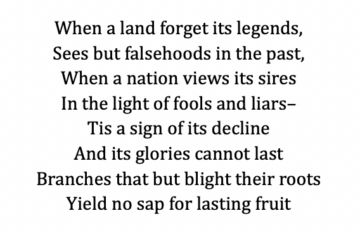In Texas, Those Who Don't Know History... Want to Control the State's Narrative of the Past
In the Texas State Historical Association’s (TSHA) March 2023 annual meeting program book, J.P. Bryan, the organization’s executive director—and former CEO of a multi-million-dollar energy company—included a poem:

The poem, by English writer J. Fairfax-Blakeborough and pulled from Walter Prescott Webb’s book glorifying the Texas Rangers, reads as a declaration of war to many Texas historians. The TSHA, the 125-year-old nonprofit that puts out widely used publications such as the Handbook of Texas, plus well-regarded periodicals and other materials, has become the latest front in conservatives’ quest to control the teaching of Texas history.
Bryan stated as much in the same program, vowing to ensure that the horror he sees as being depicted in Fairfax-Blakeborough’s poem “does not become reality in the teaching of Texas history.”
Bryan tried unsuccessfully at the TSHA’s annual conference in March to get his own candidate elected to the organization’s board. In April, in a bizarrely worded filing, he sued the TSHA president to keep the board from holding a meeting at which he expected to be fired. He won a temporary restraining order from a Galveston County judge to delay the meeting based on the allegation that the board’s current makeup is too heavily weighted toward academics, in violation of its bylaws. How this fight plays out, he told the Galveston County Daily News, “will determine the future of the way the history of Texas is written.”
Texas historians agree. Several TSHA members who spoke to the Texas Observer said they feel they are being bullied and that their jobs are in danger if they speak up. They fear Bryan’s actions will unravel the TSHA and muzzle historians, especially those of color.
Bryan told the Galveston newspaper that professional historians on the board want to “demean the Anglo efforts in settling the western part of the United States for the purpose of spreading freedoms for all.”
“That is a fairy tale,” said Ben Johnson, former TSHA board member and professor of history at Loyola University. “The idea that you’re going to make a historical organization tell only stories that are consistent with that kind of thinking—that is the death knell for any serious history.”
Republicans’ tactics here are as blunt as those they have used elsewhere. TSHA member and former state land commissioner Jerry Patterson told the Observer he drafted and sent to members of the House Appropriations and Senate Finance Committee a rider to the state appropriations bill that would withhold $480,000 from the budget of the Texas Historical Commission that is intended for the TSHA if the association’s board is not reconstituted.
“If they have violated their bylaws to improperly constitute the board, they’re in jeopardy of losing their nonprofit status. This is a very serious matter and the current president and the majority of the board don’t get it. So we have to make them get it and put a contingency on the money that they would normally get to make them get it,” Patterson said. He served on the advisory committee for the 1836 Project, an effort to indoctrinate new state motorists and others with myths about Texan white-settler heroism.
Since 1897, TSHA has built a membership of lay and professional historians to document Texas’ history. It produces the widely-used Handbook of Texas and publishes the Southwestern Historical Quarterly as well as the Texas Almanac and other books on Texas history. The organization hosts activities and creates curricula for students, teachers, and historians.
Walter Buenger, TSHA’s chief historian for the past seven years, said the organization now includes far more diverse voices, topics, and approaches to documenting Texas history than it did when the Handbook of Texas started in the 1950s when it “focused mainly on white elite men.”
At a time when the organization is becoming increasingly diverse, Buenger said, Bryan “wants to take TSHA and Texas history in a different direction” and in doing so is “alienating its members.”